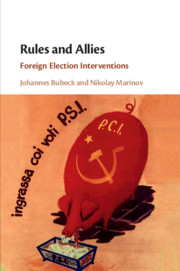Book contents
- Frontmatter
- Contents
- List of Figures
- List of Tables
- Acknowledgements
- 1 Introduction
- 2 Anarchy and Polyarchy
- 3 The Who and the How of Elections: A Theory with Interested Outsiders
- 4 Actors, Policies, Strategies: Original Data on Electoral Interventions
- 5 How Election Interventions Work: A Look at the Evidence
- 6 Captain America
- 7 When Money Runs Low and Regime Overthrow
- 8 Buying Allies
- 9 Conclusion
- Appendix
- References
- Subject Index
- Author Index
7 - When Money Runs Low and Regime Overthrow
Published online by Cambridge University Press: 15 July 2019
- Frontmatter
- Contents
- List of Figures
- List of Tables
- Acknowledgements
- 1 Introduction
- 2 Anarchy and Polyarchy
- 3 The Who and the How of Elections: A Theory with Interested Outsiders
- 4 Actors, Policies, Strategies: Original Data on Electoral Interventions
- 5 How Election Interventions Work: A Look at the Evidence
- 6 Captain America
- 7 When Money Runs Low and Regime Overthrow
- 8 Buying Allies
- 9 Conclusion
- Appendix
- References
- Subject Index
- Author Index
Summary
In this chapter, we show how changing budgets influence the mix of intervention strategies. A non-intuitive implication of our argument is that lack of funds may prompt a liberal intervener to switch to a less democratic intervention strategy. The logic is that money allows a liberal intervener a luxury of sorts: of being able to improve electoral conditions (and so make it harder for the favored government to win) while offsetting any disadvantages with massive aid, for their favored ticket. The case of Greece, in which the United States sponsored a change in electoral rules (in an undemocratic direction) in 1951–1952 conforms to this logic.Our discussion of coups provides scope condition for our argument, by showing how polarization and competitors influence the choice of electoral interventions over coups. We show that high polarization causes outsiders to prefer coups over elections. In that sense, we echo Dahl's central insight, about the conditions enabling democracy to exist. We also show that superpower competition heightens the risk of coups. The reason is that competing in elections becomes costly. The high prevalence of coups during the Cold War complies to this logic.
- Type
- Chapter
- Information
- Rules and AlliesForeign Election Interventions, pp. 179 - 202Publisher: Cambridge University PressPrint publication year: 2019



